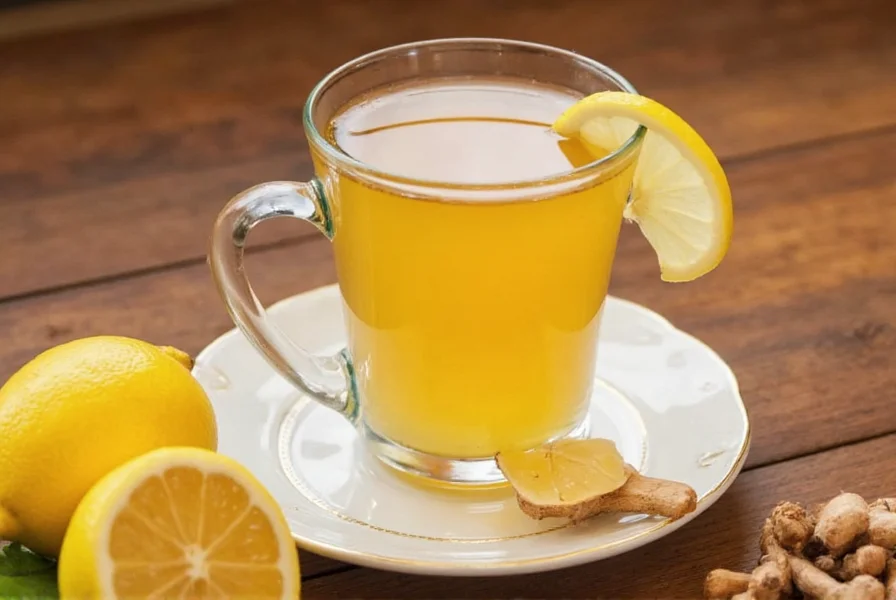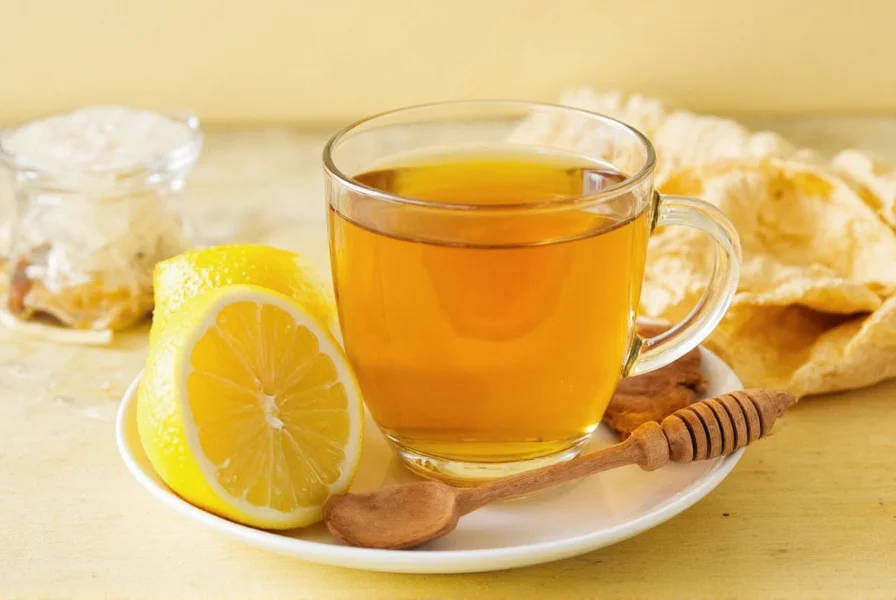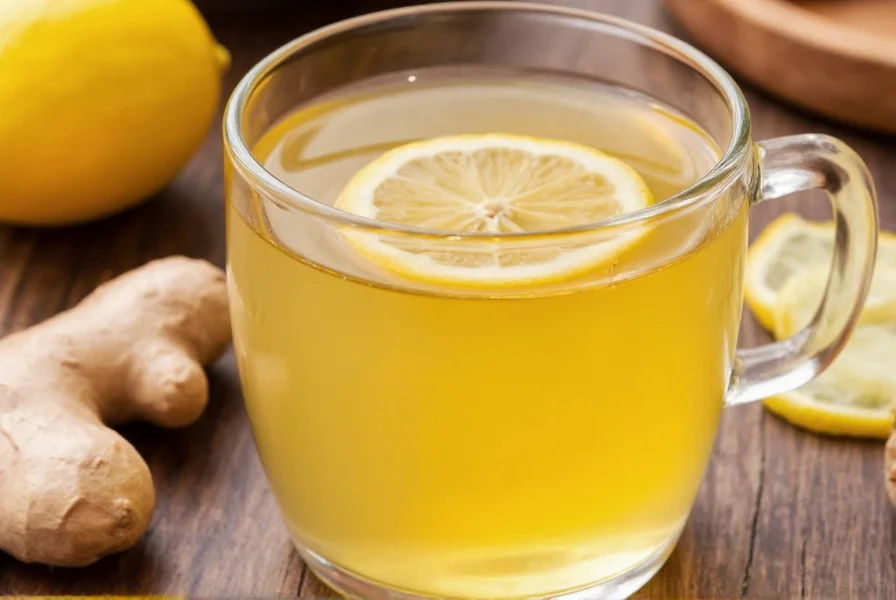For centuries, cultures worldwide have turned to ginger lemon honey tea as a comforting home remedy. This simple yet powerful combination harnesses the natural properties of three readily available ingredients to create a beverage that's both soothing and potentially beneficial for your wellbeing. Unlike commercial remedies filled with artificial ingredients, this natural preparation offers a gentle approach to supporting your body's wellness needs.
The Science Behind Ginger Lemon Honey Tea Benefits
Understanding the individual components helps explain why this combination has stood the test of time as a popular natural remedy. Each ingredient contributes unique properties that work synergistically when combined.
Ginger: Nature's Anti-Inflammatory
Ginger contains bioactive compounds like gingerol, which research suggests may help reduce inflammation and provide antioxidant effects. Studies published in the Journal of Medicinal Food indicate ginger may support digestive health by accelerating gastric emptying and reducing nausea. When preparing homemade ginger lemon honey tea for digestive support, using fresh ginger root provides the highest concentration of these beneficial compounds.
Lemon: Vitamin C and Beyond
Lemons contribute more than just tart flavor. They're rich in vitamin C, flavonoids, and citric acid. While lemon juice alone won't cure a cold, its vitamin C content supports immune function. The citric acid may also help with hydration and provides a refreshing quality that makes ginger lemon honey tea for sore throat more palatable when you're feeling under the weather.
Honey: More Than Just Sweetness
Honey brings natural sweetness along with potential antimicrobial properties. Research in the journal Pediatrics found honey may be more effective than some over-the-counter cough medicines for nighttime cough relief in children over one year old. When making soothing ginger lemon honey tea for cough, raw, unprocessed honey may retain more beneficial compounds than highly processed varieties.
How to Make Perfect Ginger Lemon Honey Tea
Creating an effective ginger lemon honey tea requires attention to preparation methods. The timing of when you add each ingredient affects the final beverage's properties.
| Ingredient | Amount | Preparation Tip |
|---|---|---|
| Fresh ginger root | 1-2 inches | Peel and slice thinly or grate for maximum extraction |
| Fresh lemon | Half | Use whole slices or juice after steeping |
| Honey | 1-2 tablespoons | Add after cooling to preserve beneficial compounds |
| Water | 2 cups | Filtered preferred for best taste |
Step-by-Step Preparation
- Peel and thinly slice 1-2 inches of fresh ginger root
- Bring 2 cups of water to a boil
- Add ginger slices and simmer for 10-15 minutes (longer for stronger tea)
- Remove from heat and let cool for 5 minutes
- Add the juice of half a lemon (or 2-3 slices)
- Stir in 1-2 tablespoons of honey after the tea has cooled to below 140°F (60°C)
- Strain if desired and enjoy warm
For those seeking how to make ginger lemon honey tea for immunity support, consider adding a pinch of turmeric or black pepper to enhance absorption of beneficial compounds. The key to maximizing benefits is using fresh ingredients and proper preparation techniques that preserve the active components.

When Ginger Lemon Honey Tea Works Best
This natural remedy shines in specific situations where gentle, supportive care is needed:
- Early cold symptoms - When you first notice a sore throat developing
- Digestive discomfort - After a heavy meal or during occasional indigestion
- Morning wellness ritual - As part of a healthy daily routine
- Hydration boost - When you need fluids but want more than plain water
Research suggests timing matters when using ginger lemon honey tea for sore throat relief. Consuming it at the first sign of discomfort may provide more noticeable benefits than waiting until symptoms become severe. For digestive support, having a cup about 20 minutes before meals may help prepare your system.
Important Considerations and Limitations
While ginger lemon honey tea offers potential benefits, it's crucial to understand its limitations:
- Honey should never be given to children under one year due to botulism risk
- Those with ginger allergies should avoid this preparation
- It's not a substitute for medical treatment for serious conditions
- Excessive consumption may cause heartburn in sensitive individuals
When considering ginger lemon honey tea benefits for immune system, remember it supports but doesn't replace other healthy habits like proper sleep, nutrition, and handwashing. The evidence for many health claims comes from studies on the individual ingredients rather than the specific combination, so expectations should be realistic.

Customizing Your Ginger Lemon Honey Tea
One reason for this remedy's enduring popularity is its versatility. You can easily adapt homemade ginger lemon honey tea recipe to suit different needs:
- For congestion: Add a pinch of cayenne pepper to help clear nasal passages
- For relaxation: Include a teaspoon of chamomile flowers during steeping
- For extra immunity support: Add a slice of fresh turmeric root
- For cold preparation: Chill after steeping and serve over ice
Experiment with steeping times to find your preferred strength. Some prefer a milder ginger lemon honey tea for daily wellness, while others want a stronger version for symptom relief. The beauty of this natural remedy is that you can adjust it to your specific needs and preferences.
Frequently Asked Questions
How often can I drink ginger lemon honey tea safely?
Most adults can safely enjoy 1-3 cups of ginger lemon honey tea daily. Those using it for specific wellness purposes might consume it more frequently for short periods (3-5 days), then return to moderate daily consumption. People with sensitive stomachs may want to limit to 1 cup daily. Always consult your healthcare provider if you have specific health concerns.
Can I make ginger lemon honey tea without honey?
Yes, you can make ginger lemon tea without honey by using alternative sweeteners like maple syrup or simply enjoying it unsweetened. However, honey contributes unique properties including potential antimicrobial benefits. For children under one year, honey should be avoided entirely due to botulism risk, so maple syrup makes a safer alternative for young children.
How long does ginger lemon honey tea stay effective after preparation?
Freshly prepared ginger lemon honey tea offers maximum benefits. When stored in a sealed container in the refrigerator, it maintains most of its properties for 24-48 hours. After this time, the vitamin C content decreases and the ginger compounds begin to degrade. For best results, prepare small batches and consume within one day. Avoid reheating multiple times as this further reduces beneficial compounds.
When is the best time to drink ginger lemon honey tea for maximum benefits?
The optimal timing depends on your purpose. For digestive support, drink 20 minutes before meals. For sore throat relief, consume at the first sign of symptoms and repeat every 2-3 hours as needed. As part of a wellness routine, many find morning consumption energizing while evening consumption promotes relaxation. For immune support during cold season, spreading consumption throughout the day may provide continuous support.











 浙公网安备
33010002000092号
浙公网安备
33010002000092号 浙B2-20120091-4
浙B2-20120091-4